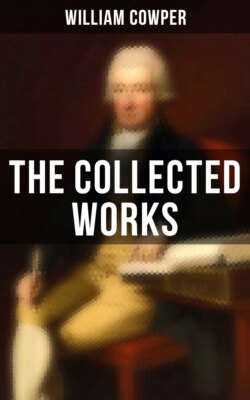Читать книгу The Collected Works - William Cowper - Страница 14
На сайте Литреса книга снята с продажи.
TO LADY HESKETH.
ОглавлениеTable of Contents
July 12, 1765.
My dear Cousin—You are very good to me, and if you will only continue to write at such intervals as you find convenient, I shall receive all that pleasure which I proposed to myself from our correspondence. I desire no more than that you would never drop me for any length of time together, for I shall then think you only write because something happened to put you in mind of me, or for some other reason equally mortifying. I am not, however, so unreasonable as to expect you should perform this act of friendship so frequently as myself, for you live in a world swarming with engagements, and my hours are almost all my own. You must every day be employed in doing what is expected from you by a thousand others, and I have nothing to do but what is most agreeable to myself.
Our mentioning Newton's treatise on the Prophecies brings to my mind an anecdote of Dr. Young, who you know died lately at Welwyn. Dr. Cotton, who was intimate with him, paid him a visit about a fortnight before he was seized with his last illness. The old man was then in perfect health; the antiquity of his person, the gravity of his utterance, and the earnestness with which he discoursed about religion, gave him, in the doctor's eye, the appearance of a prophet. They had been delivering their sentiments upon this book of Newton, when Young closed the conference thus:—"My friend, there are two considerations upon which my faith in Christ is built as upon a rock: the fall of man, the redemption of man, and the resurrection of man, the three cardinal articles of our religion, are such as human ingenuity could never have invented, therefore they must be divine; the other argument is this. If the prophecies have been fulfilled (of which there is abundant demonstration), the Scripture must be the word of God, and if the Scripture is the word of God, Christianity must be true."
This treatise on the prophecies serves a double purpose; it not only proves the truth of religion, in a manner that never has been, nor ever can be controverted; but it proves likewise, that the Roman Catholic is the apostate, and the anti-Christian church, so frequently foretold both in the Old and New Testaments. Indeed so fatally connected is the refutation of Popery with the truth of Christianity, when the latter is evinced by the completion of the prophecies, that, in proportion as light is thrown upon the one, the deformities and errors of the other are more plainly exhibited. But I leave you to the book itself; there are parts of it which may possibly afford you less entertainment than the rest, because you have never been a school-boy, but in the main it is so interesting, and you are so fond of that which is so, that I am sure you will like it.
My dear cousin, how happy am I in having a friend, to whom I can open my heart upon these subjects! I have many intimates in the world, and have had many more than I shall have hereafter, to whom a long letter upon these most important articles would appear tiresome at least, if not impertinent. But I am not afraid of meeting with that reception from you, who have never yet made it your interest that there should be no truth in the word of God. May this everlasting truth be your comfort while you live, and attend you with peace and joy in your last moments! I love you too well not to make this a part of my prayers; and when I remember my friends on these occasions, there is no likelihood that you can be forgotten.
Yours ever,
W. C.
P.S.—Cambridge. I add this postscript at my brother's rooms. He desires to be affectionately remembered to you, and if you are in town about a fortnight hence, when he proposes to be there himself, will take a breakfast with you.
